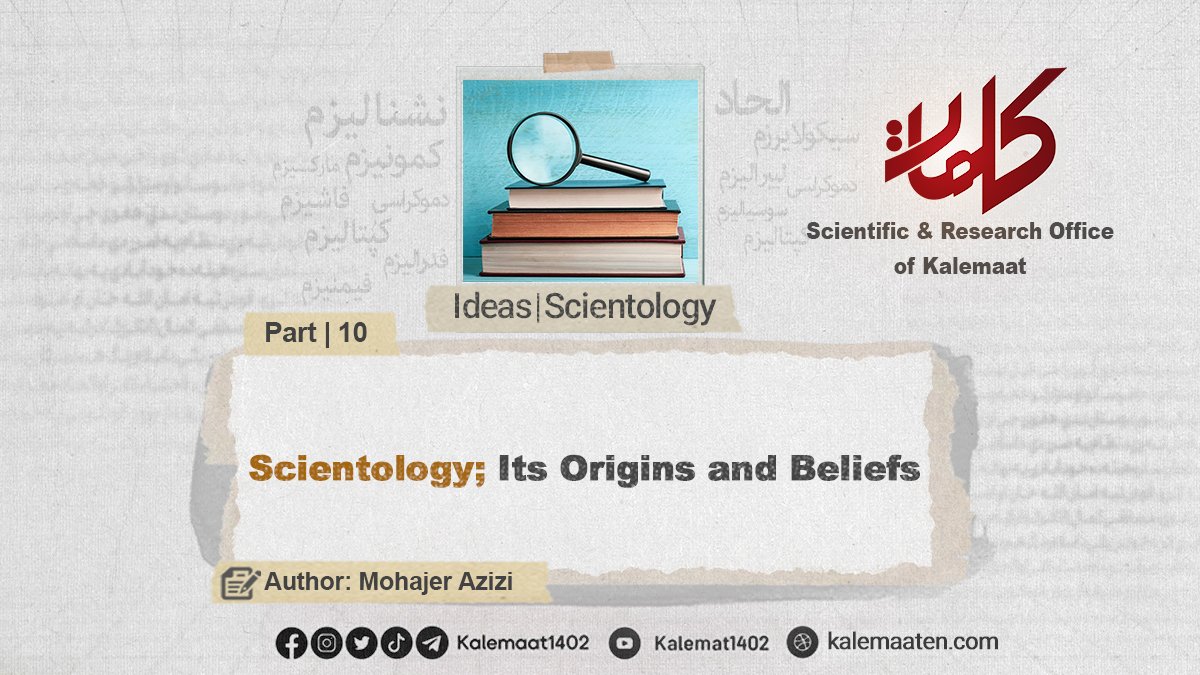Author: Mohajer Azizi
Scientology; Its Origins and Beliefs (Part Ten)
Preface
In the previous section, we examined the concept of “god” in Scientology and critiqued it from the viewpoint of Islam. There, we raised the question of whether Scientology recognizes any deity worthy of worship. Now, continuing that same discussion, we arrive at another question that lives within every truth-seeking human: “If there is a path toward truth, can it be traversed without a guide or messenger?”
Throughout history, the human being has always searched for signs that could reveal the secret of creation, the meaning of life, and the correct way to live. Most religions and schools of thought have found the answer to this inner need in “prophets” and “divine revelation.”
However, Scientology has a completely different view; it denies the existence of prophets and the necessity of heavenly missions and believes that salvation lies only in discovering the inner forces of the human being.
In this section, we turn to the concept of “Prophethood.” We will first review Scientology’s view regarding its rejection of any intermediary between the human and the truth, and then, by means of rational, innate, and scriptural proofs in Islam, we will show that prophets are not only the true messengers of Allah, but also an answer to one of the fundamental and natural needs of human beings.
This discussion is not merely a comparison between two viewpoints; it is an attempt to answer one of the deepest questions of humanity:
Can a human being reach complete truth on his own, or does he need guidance from the Lord of the worlds in order to find it?
Beliefs and Ideas of Scientology and a Critique of It
2. Prophethood (Nubuwwah)
a. Definition of Nabi and Rasul
The word “nabi” in Arabic is derived from “naba’” meaning “news” or “report.” Allah the Exalted says: «عَمَّ يَتَسَاءَلُونَ، عَنِ النَّبَإِ الْعَظِيمِ [1]. »
A prophet is called a nabi because he both receives news and conveys news. He is mukhbar that is, Allah has informed him and revealed to him as stated: «قَالَتْ مَنْ أَنْبَأَكَ هَذَا قَالَ نَبَّأَنِيَ الْعَلِيمُ الْخَبِيرُ [2] »
He is also mukhbir; one who announces Allah’s command and revelation to the people, as in: «نَبِّئْ عِبَادِي أَنِّي أَنَا الْغَفُورُ الرَّحِيمُ [3] » «وَنَبِّئْهُمْ عَنْ ضَيْفِ إِبْرَاهِيمَ [4]. »
The Arabic word “rasul” comes from “irsal” meaning “to send” or “to dispatch.” When you send someone on a mission, that person is your rasul. Allah relates the Queen of Sheba’s words: «وَإِنِّي مُرْسِلَةٌ إِلَيْهِمْ بِهَدِيَّةٍ فَنَاظِرَةٌ بِمَ يَرْجِعُ الْمُرْسَلُونَ [5]. »
Sometimes “rasul” is also used for one who follows the news or affairs of the one who sent him, as in the Arab expression: «جاءت الإبلُ رَسَلاً» (The camels came one after another).
Based on this, the messengers are called “rasul” because they have been sent by Allah the Exalted: «ثُمَّ أَرْسَلْنَا رُسُلَنَا تَتْرَا[6] »
They have been assigned a specific message from Allah that they must convey, implement, and follow up. [7]
However, the definition preferred and accepted by many scholars is as follows: “A Rasul is someone who is sent from Allah with a new divine law (shari‘ah), whereas a Nabi is someone who follows a previous shari‘ah and conveys and promotes the same rulings to the people.” [8]
-
Groups That Deny Prophethood
From the viewpoint of Allamah Mawardi, the groups that deny prophethood are divided into three categories,[9] but in a broader classification, they are divided into four groups:
First group:
The Dahriyyah — the irreligious who deny the existence of God.
They claim that the world is eternal and without beginning, and that nature manages everything.
So, someone who does not believe in God and Creator will naturally deny His messengers as well.
Second group:
The Brahmins (followers of Brahman).
They believe in the oneness of God and that the world was created, but at the same time they deny the sending of prophets and consider prophethood invalid.
They follow a man named Bahar (Bahrman). A small faction among them went astray and said that this man was actually Adam (PBUH), the father of humankind.
Some said he was Abraham (PBUH).
Some accepted the prophethood of only these two prophets and denied the prophethood of all other prophets (peace and blessings be upon them).
However, most Brahmins reject this idea and deny all forms of prophethood altogether.
Third group:
These are the philosophers who outwardly do not deny prophethood, but in reality, their statements and beliefs nullify it.
They claim that divine knowledge (meaning revelation and the knowledge of the prophets, peace be upon them) is attained only after a person reaches perfection in philosophical and mathematical sciences.
According to them, anyone whose nature is prepared for these sciences can obtain that knowledge on their own.
Fourth group:
The Scientology sect.
This creed has no clear or firm position on the existence of God or belief in Him, and leaves it to each individual’s personal experience.
However, it completely rejects prophethood and denies any necessity for it.
In the following section, we will examine the subject of prophethood from the perspective of Scientology and then critique and refute it based on the teachings of Islam.
To be continued…
Previous Part/ Next Part
References:
- Sūrah al-Naba’: Verses 1–2
- Sūrah al-Taḥrīm: Verse 3
- Sūrah al-Ḥijr: Verse 49
- Sūrah al-Ḥijr: Verse 51
- Sūrah al-Naml: Verse 35
- Sūrah al-Mu’minūn: Verse 44
- Sources: Lisān al-‘Arab, vol. 2, pp. 1166–1167; al-Miṣbāḥ al-Munīr, p. 266; al-Rusul wa al-Risālāt, p. 13
- Tafsīr al-Ālūsī, vol. 7, p. 157
- al-Māwardī, I‘lām al-Nubuwwah, p. 36



